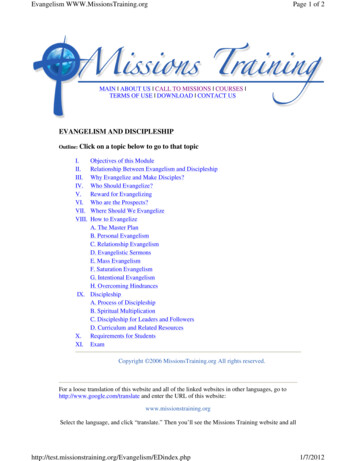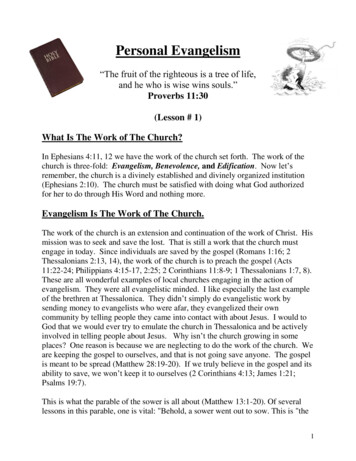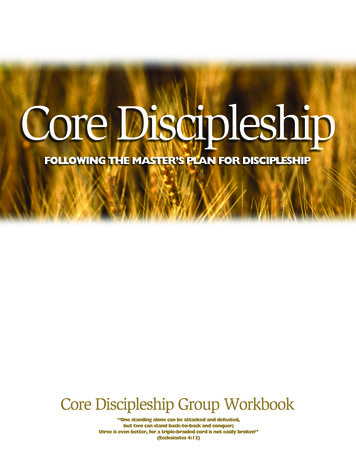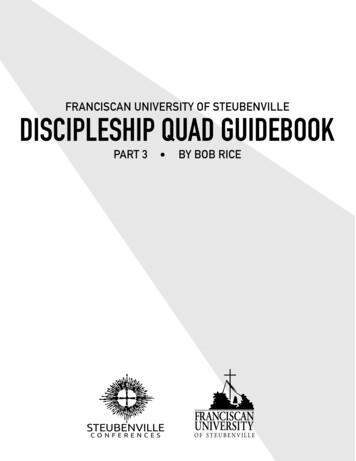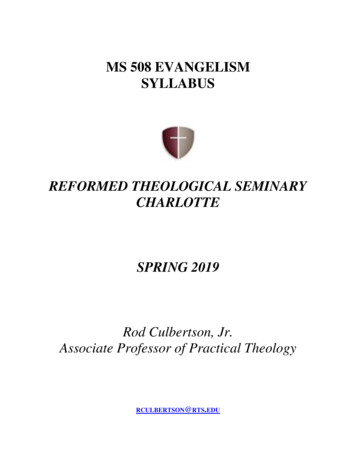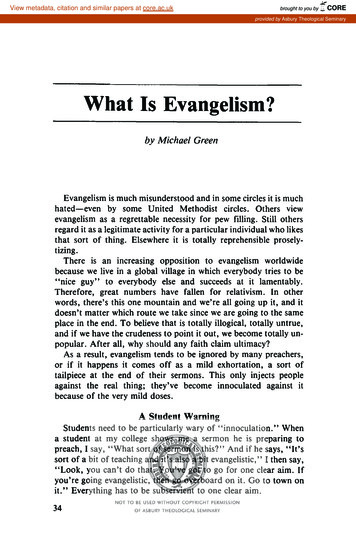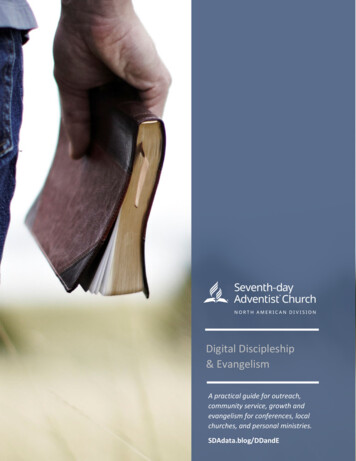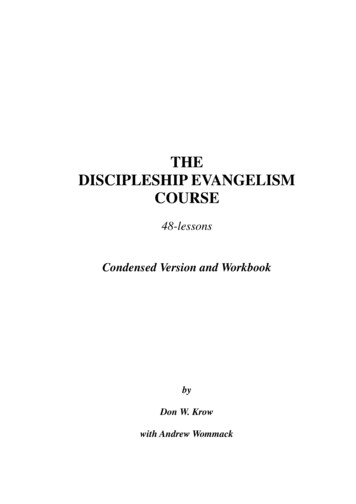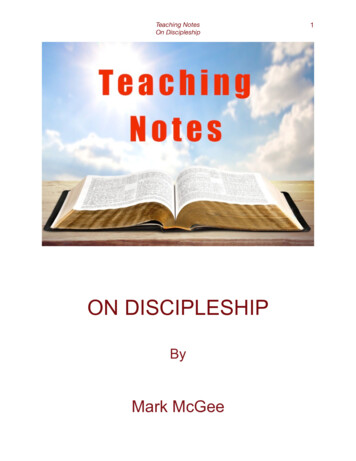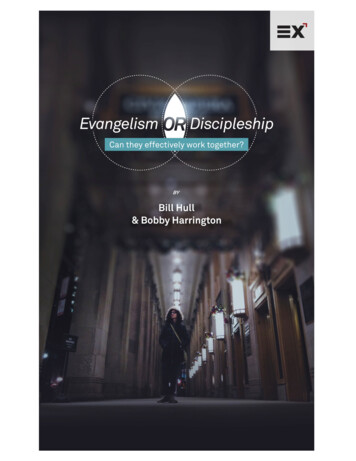
Transcription
Evangelism or DiscipleshipCan They EffectivelyWork Together?byBill Hull and Bobby Harrington
Evangelism or Discipleship: Can They Effectively Work Together? Bill Hull and Bobby Harrington 2014Distributed via Exponential ResourcesExponential is a growing movement of leaders committed to the multiplication ofhealthy new churches. Exponential Resources spotlights and spreads actionableprinciples, ideas and solutions for the accelerated multiplication of healthy,reproducing faith communities. For more information, visit exponential.orgAll rights reserved. No part of this publication may be reproduced, stored in aretrieval system, or transmitted in any form or by any means—electronic,mechanical, photocopy, recording, or any other—except for brief quotations inprinted reviews, without the prior permission of the publisher.Requests for information should be addressed to:Bobby Harrington, 1101 Gardner Dr., Franklin, TN 37064.Scripture quotations marked NIV are from THE HOLY BIBLE, NEWINTERNATIONAL VERSION , NIV Copyright 1973, 1978, 1984, 2011 byBiblica, Inc. Used by permission. All rights reserved worldwide.Scripture quotations marked ESV are from The Holy Bible, English StandardVersion (ESV ), copyright 2001 by Crossway, a publishing ministry of GoodNews Publishers. Used by permission. All rights reserved.Scripture quotations marked (NLT) are taken from the Holy Bible, New LivingTranslation, copyright 1996, 2004, 2007 by Tyndale House Foundation. Usedby permission of Tyndale House Publishers, Inc., Carol Stream, Illinois 60188. Allrights reserved.Occasionally, italics are used by the author in Scripture quotations for emphasis.CreditsCover and Interior Design: Josh ShankEditor: Lindy Lowry
WITH THANKS TO Discipleship.orgWe dedicate this eBook to a future renewal of the focus on discipleship and theministry of discipleship.org.ExponentialThank you Todd Wilson and Lindy Lowry. Lindy, we really appreciate all yourservant-hearted support, encouragement and practical wisdom with this eBook.
ContentsA Commission and Our PerspectiveJesus Is the GospelThe Call to Make Disciples in Matthew 28:18-20The Activation of the Saints in Ephesians 4:12-16
IntroductionA Commission and Our PerspectiveThe simple program of Christ for winning the whole world is to make eachperson He touches magnetic enough with love to draw others. --Frank Laubach1Over the years of doing and leading ministry in the local church, we both agreethat the church’s most difficult problem is not growth or the revolving door assome might say. But rather, the church’s deepest challenge lies in convincing itscitizens that who they are and what they do outside of church services is thereal work of God. Some have called it “being in the world,” or “being onmission.”We think there is wide agreement among church leaders that getting people todo what they should out there is more difficult than getting them to gather inhere. For that reason, far too many leaders and churches have dropped theexpectation that the common Christian will actually reap any kind of harvest intheir normal lives. After all, such an amorphous ideal is impossible to control,difficult to count and may not make the church bigger or more prominent.The title of this eBook sets up a competition of sorts between evangelism anddiscipleship. Indeed, some people think about the two as competitors or at oddswith each other. But is it possible that discipleship and evangelism are not incompetition? Could it be that they are like brothers from the same father? Theykeep turning up at each other’s parties and special events. People speak ofthem in the same sentences and name academic courses after them. They’reoften at the crux of a question during a panel discussion or study: “What is therelationship of evangelism to discipleship?” Or the more provocative inquiry,“What comes first, evangelism or discipleship—can you have one without theother?”They might seem in conflict with each other because they share a certainlikeness. Maybe we feel the need to focus on, or emphasize, one over the other.Yet, clearly when you have only one and not both, things do not go well.Evangelism without discipleship tends to be short-lived, focused on packaging,presenting, counting and impressing. Conversion becomes the finish line; all iswell, and any further duties are optional.I (Bobby) grew up as a non-Christian, and I still have lots of non-believingfriends. One of my biggest regrets is Gayle, one of our best friends. My wife andI led her to Christ. She seemed so excited and on fire at first. But then it was likeshe had enough; it required too much of her. And honestly, we could have donebetter in what we taught her back then. It was as if Gayle made a deal with God;her eternal insurance was purchased. Despite our efforts, she never really got
that conversion was about trusting and following Jesus for life. I’m sure you’vehad a Gayle in your own life.On the flip side, discipleship without evangelism creates the very unhealthycondition of sterility in followers of Christ. Christians who do not evangelize arenot fulfilled in their lives, and they take on a certain intramural pettiness. Whenpeople are educated beyond their level of obedience, they become religiousschizophrenics, experts on what they are not experiencing.Both discipleship and evangelism are needed. Could it be that evangelism is thefront end of discipleship, and maturing those who believe is the back end?When one or the other is lacking, Christians and their churches suffer. Moreimportantly, what Jesus told us to do suffers.Words matter. So before we go any further, we should define what we mean byevangelism and discipleship.EvangelismTo some degree, evangelism and discipleship are invented words, coined todescribe important functions. Evangelism is rooted in the Greek wordeuaggelion, meaning good news. Historically, “to evangelize,” meant toannounce the Good News. Now, we use evangelism as a catchall term for theentire field of study, research and the process of spreading the gospel.We can’t hope to thoroughly explore the present state of evangelism in thiseBook, but we can identify three observations that may be helpful in describingevangelism in the Western Hemisphere.1. Universally, evangelical Christians agree that evangelism must be done.And while most of us would never admit it, there is also near universalagreement that you can be a good Christian and not evangelize. We saythis with confidence. Consider the recent statistic that less than a quarterof church-going Protestants engage in telling others about Christ in a waythat helps the person listening make an informed decision.22. We have no real consistent expectation that the common believer willreproduce him or herself and teach others in direct response to Christ’scommand to make disciples. We need to ask the church’s teachers andmembers, “What is your reason for not obeying our Lord’s commission tomake disciples?”3. Over the last 50 years, various kinds of aggressive evangelism have notyielded the hoped-for crop of new believers who could have penetratedall domains of society—the domains meant to transform the culture. Thishas nothing to do with how many have decided to follow Jesus, butrather how many have been taught that they are expected to penetrate
their sphere of influence. Evangelicals have been successful in otherareas—crusades, public forums, television and new media. These efforts,while an adrenaline rush for Christians, have not touched the nationalcharacter, especially in the church. The church has lost ground,increasingly living on the margins. And the general public thinks ofevangelism as simply bothering people. The good news is that the churchis desperate to find a better way, which could be that reaching people ismore private than public, and is personal and rooted in relationships. Itcould be that the solution is hand to hand, person by person, found in thecommon ordinary situations of life.DiscipleshipLike evangelism, the word “discipleship” is not in the Bible.3 By adding “ship” toit, discipleship literally means “the state of learning” or “following a teacher.”Some people like to refer to it as apprenticeship, which we think is a gooddescription.4 At its roots, Christian discipleship means to follow and learn fromJesus. In Matt. 28:18-20, disciple making is described as a “core mandate”(which we take as a synonym for discipleship).“Then Jesus came to them and said, ‘All authority in heaven and on earth hasbeen given to Me. Therefore, go and make disciples of all nations, baptizingthem in the name of the Father and of the Son and of the Holy Spirit, andteaching them to obey everything I have commanded you. And surely I am withyou always, to the very end of the age’” (NIV).We suggest a definition for discipleship (and disciple making) based on Matt.28:18-20 and Jesus’ example: “Discipleship as trusting God’s presence as weintentionally enter into the lives of others to guide them to trust and follow Jesusand obey all his teachings”5Unfortunately, the church has reduced discipleship to a program rather than alife of following Christ and learning from Him, as He modeled for His disciples.That programmatic approach has created a negative perception of discipleshipin many who have “tried” some curriculum or program that didn’t help them. Butas an introductory matter, we offer some observations about the state ofdiscipleship.1. Discipleship as a movement needs to fully emerge from its own selfconstructed ghetto. Measuring spiritual maturity by cognitive achievementor Bible knowledge rather than fruitfulness created the ghetto. For thoseserious and intentional about their faith, the ghetto became a safe haven.Discipleship is often head-centered, focusing on Bible education. Thecommon person who isn’t committed to in-depth Bible study tends to shyaway from it.
2. The discipleship movement is often in crisis due to the disconnectionbetween discipleship and reproduction. A movement based on the ideathat it will reproduce and doesn’t will languish. The “teaching them toobey everything Christ commanded” part of the Great Commission didn’tcreate reproduction because it fell into the same dark hole of lowexpectations—the same expectations that often sink evangelism. Instead,we need to figure out how to cast vision for high expectations ofmultiplication3. Next to reproduction, the most difficult part of discipleship is life-on-lifeaccountability, which is absolutely necessary and very prone to abuse.We tend to be either too controlling or too slack, as though followthrough doesn’t matter. People need encouragement, support and oftena firm hand to help them keep their commitments to God. Legalism andcontrol don’t work, but as leaders we do need to find ways to counteracta strong strain of libertarianism in the church when it comes to personalaccountability. This is ground zero—where the battle is often fought.The commission to make disciples is at the very heart of where evangelism anddiscipleship meet. Jesus issued the Great Commission to give His followersboth a reason (to save the world) and a plan (to find and make more disciples).Our Perspective:Evangelism and discipleship are not two things; they are one. Jesus hascommanded us to “make disciples.” Two subordinate phrases describe how weaccomplish the Great Commission.6 The first part of making disciples is theprocess of a person “coming to trust in and follow Jesus.” The Bible sees thatprocess being confirmed in baptism. The second part of making disciples is“teaching people to obey all that Jesus commanded.” We commonly think ofthis second part as discipleship, a lifelong journey of learning from Jesus how tolive one’s life as though Jesus were living it.Jesus’ Matthew 28 commandment included the expectation of reproduction,that new disciples would become well-taught disciples who would in turnembrace the mission and make other new disciples. Anything less is tosabotage the master plan. Evangelism is simply a form of pre-conversiondiscipleship. The two—evangelism and discipleship—are the front and back ofthe same coin, if you will. When we engage in this disciple-making process,Jesus tells us that He will be present with us—to the end of the age (Matt.28:20).The Question:Thirty years after graduation from seminary, I (Bill) was asked to address thefaculty and student body at my alma mater. I began with a question, “After thirty
years of ministry, I still wonder why the church insists on trying to reach theworld without making disciples?”That question strikes at the heart of this discipleship-evangelism matter. Thechurch continues to struggle with a disconnected mission. Disciples have amission, and the mission is to reach people. Evangelism necessitates discipleswho have matured to the point of reproduction. Discipleship includesevangelism, and evangelism is a part of discipleship.
Jesus Is the GospelAs we mentioned earlier, the root word for “evangelism” is euangelion. It is alsothe root word for “the gospel.” Euangelion simply means, “good news.” In asense, evangelism is “good news-ing people,” telling them about Jesus, who isHimself, the “Good News.” Following this logic, evangelism and the gospel pointus to Jesus.A proper understanding of Jesus as the gospel helps us connect evangelismand conversion to discipleship. The way we present the gospel often causes aseparation between evangelism and discipleship. It is easy for us to start at thecross and ask for a decision, while skipping the life, the teaching, theresurrection and current reign of King Jesus, to say nothing of His teaching onwhat it means to be a disciple. Some actually think that a gospel of the cross isall that is necessary for evangelism.Granted, just explaining what Jesus did on the cross and asking for a responseor decision is a simpler approach. But it leaves the impression with too manypeople that conversion is the finish line, not the starting line. In this chapter, wewant to suggest a fuller gospel presentation and an invitation to a fuller,covenant-making response that will link evangelism and discipleship. Let’s takea brief look at how this coupling works, using three passages from the Gospel ofMark.Lets start with the concept of the gospel. What is it and what does it mean topresent the gospel to others? A brief look at the Gospel of Mark indicates thatthe gospel is much more than just the cross.Mark begins his Gospel by saying that the gospel is summed up in Jesus, aseverything about Him is the gospel:“The beginning of the gospel of Jesus Christ, the Son of God” (Mark 1:1, ESV).The whole book of Mark is about Jesus, who in His person is the gospel.Evangelism, Mark shows us, is a proclamation of the kingdom of God and theinvitation to repent and believe in the gospel.“The time is fulfilled, and the kingdom of God is at hand; repent and believe inthe gospel” (Mark 1:14-15).When Jesus makes this invitation, He has yet to die for the sins of people, butHe still invites them to believe in the gospel. Here, the gospel is about Jesus, Hiskingdom and the need for repentance.Then Mark tells us that the gospel includes the call to make radical decisions of
obedience. We cannot be true disciples unless we are willing to lose our life forthe gospel:“Then He called the crowd to Him along with His disciples and said: “Whoeverwants to be My disciple must deny themselves and take up their cross andfollow Me. For whoever wants to save their life will lose it, but whoever losestheir life for Me and for the gospel will save it” (Mark 8:34-35, NIV).The gospel, as Jesus teaches us here, is unconditional loyalty to Him. Ashumanity’s true king, he deserves full surrender and loyalty.So evangelism, as Scripture shows, is the invitation of the gospel to come toJesus for both salvation and discipleship. Both parts are integral. Again, Mark(and the rest of the New Testament) teaches us that evangelism is an invitationto come to Jesus by faith for a relationship grounded in a willingness tosurrender all to be a disciple.The coupling of these teachings is the whole gospel. At the same time, we wantto fully acknowledge that there is a core gospel focused on His grace throughthe cross. We want to emphasize both.Over the last 10 years, I (Bill) was fortunate to spend a lot of time with DallasWillard before he died. It was Dallas who first pointed out to me that one of thereasons why we have a discipleship problem today is because of the way weoften present the gospel. Too often, we teach and share a transactional gospelthat does not explicitly necessitate obedience to Jesus and a life of beingformed into His image. So moving into a more holistic linking of evangelism anddiscipleship starts with a broader understanding of the gospel.The Storyline of the BibleThe storyline of the Bible is the story of God’s relationship with humanity andGod’s long promised kingdom, as outlined in the Old and New Testaments.7Below, we’ve summarized the key movements of that story.8 CREATION: God is holy and loving; He created us for Himself in paradise. FALL: We rebelled against God, under Satan’s influence. We are now allseparated from Him, gravitating to sin in thought, word and deed; yet Godgraciously promised Abraham that He would bless the world through him.Abraham believed God and became the father of the nation of Israel and God’spromises, including a future kingdom that would never end. REDEMPTION: God sent Jesus into the world to establish His kingdom as theMessiah of Israel and our King. This incarnational move fulfilled the promise toAbraham and the prophecies in the Old Testament scriptures. Jesus took the
penalty for our sin on the cross, rose from the dead, and defeated Satan. He isThe Way we restore our relationship to God and enter the kingdom. Jesusascended to heaven, where He now reigns. He is the Savior, King of Kings andLord of Lords. RESTORATION Jesus redeems those who turn from their sin (repent), trust andfollow Him, and obey all of His teachings (by faith). They enter His kingdom now.He will come back to judge the living and the dead and will take His obedientchildren into His eternal kingdom, the renewed created order or paradise ofGod.This summary illustrates the broad story line for the gospel. All of God’spromises for humanity are fulfilled in Jesus. Within the story of the Bible and thekingdom is the gospel—His life, victory over sin and death for the sake ofhumanity through the cross, and kingdom reign.The Heart of the GospelLet’s look at the core gospel of Jesus’ cross. Our eternal destiny depends onwhether or not we are saved by God through Jesus in His cross—in His death,burial, and resurrection. 1 Cor.15: 1-6 shows us that this focus is the key orfoundational item of our faith:“Now I would remind you, brothers, of the gospel I preached to you, which youreceived, in which you stand, and by which you are being saved, if you hold fastto the word I preached to you—unless you believed in vain. For I delivered toyou as of first importance what I also received ” (ESV).Paul’s language is clear—your faith in Jesus and His work on the cross is thebasis of your standing with God. You are saved through it, and there is nothingmore important! The passage goes on to summarize the core gospel:“Christ died for our sins in accordance with the Scriptures, that He was buried,that He was raised on the third day in accordance with the Scriptures, and thatHe appeared to Cephas, then to the 12. Then He appeared to more than 500brothers at one time, most of whom are still alive, though some have fallenasleep” (ESV).Here, the gospel focuses on Jesus Christ’s death for our sin. But even thisgospel is not just His death—it includes His burial and resurrection—and howthey are in accordance with the broader story of Scripture. Jesus is God’s son,and He conquered sin and death. He is now the reigning king of humanity, andHis kingdom will be fully consummated when He returns.This focus offers the broader picture assumed throughout the Bible and inPaul’s letters to the church in Rome (Rom. 3:24-25) and Ephesus: “ by grace
you have been saved through faith. And this is not your own doing; it is the giftof God” (Eph. 2:8, ESV).9 John 3:16 also sums it up: “For God so loved theworld that He gave his only Son, that whoever believes in Him should not perishbut have eternal life” (ESV).This core gospel is fundamental to Jesus, but He is more than just His cross.He came to proclaim a kingdom and invite us into salvation and discipleship.Please note this truth: This gospel of Jesus requires discipleship. Jesus does notjust want a transaction where He takes away our sin—He wants to take awayour sin and transform our lives. He doesn’t just want to give us life in eternity; Hewants to give us a new life in this world. The invitation is salvation and life underHis kingship, where we are transformed. It is a response for now and foreternity. As leaders, we must teach this whole gospel.As those seeking true discipleship in His kingdom, we must surrender to KingJesus. To fully surrender, we need help. God leads us to Jesus and promises tobe present by His Spirit (Eph. 1:13-14). But we also need people to enter intoour lives to help us make the decision to commit our lives to trust and followJesus—and to help us obey all of His teachings.Evangelism and a Covenant CommitmentWe think the concept of a covenant commitment is also important in thisdiscussion and in the linkage of evangelism and discipleship. Covenants are abig deal in the Bible. A covenant is a special relationship where parties formallycommit themselves to each other. It is not a transaction, but a deeplymeaningful relationship. A covenant is an agreement where God invites us, leadsus and freely binds Himself to us. We respond, as His gracious Spirit leads, andcommit ourselves to Him. King Jesus calls to us to complete trust andsurrender.Think of the Israelites and the covenant God called them into in the desert atMount Sinai (Deut. 5:1 ff). God delivered the Israelites out of Egypt by His mercyand grace and committed Himself to them. But in this relationship, He made itclear that He expected the people to walk with and follow Him. He expectedthem to fully obey Him and carefully follow His commands (Deut. 28:1-2).Covenants are like that—they are not just transactions where we make a dealwith vague promises to somehow follow up on it. In the Bible, God graciouslyoffers covenants, but He calls for a covenant response, a whole life commitmentto His covenant offers.Think of a wedding ceremony covenant. It is a good, everyday analogy. Both ofus have performed many wedding ceremonies. According to tradition, we askthe man if he will “take this woman to be his wife, promising before God, his
family, and friends that he will stay with her in sickness and in health, inprosperity and in adversity, so long as they both shall live.” Then we turn andask the woman the same thing. In this pledge, the marriage ceremony becomesa covenant, an agreement between two parties, where they pledge themselvesto each other. It is not a transaction. It is two people entering into a deeplypersonal commitment to one another. Covenants, like wedding ceremonies,involve commitment, confession and physical expression.Just like with a wedding ceremony, dedication to Jesus is a deeply personalcommitment. God is the initiator: He sent His son for us and woos us by HisSpirit. He promises forgiveness, His presence, and life in His kingdom. Werespond with faith, which is to be a deep, lifelong commitment to “trust, follow,and obey.” Once we enter into the covenant relationship, our lives will never bethe same.We see evangelism as that part of discipleship where people are invited to enterinto a covenant relationship with the Father, Son and Holy Spirit. According toMatt. 28:18-20, a person makes the decision to trust and follow Jesus(confirmed in baptism) and also commits to obey all of His teachings (truediscipleship). This is an invitation to a covenant relationship.As these examples in Scripture show us, God is the true power source in thecovenant. Through Jesus, He promises that we receive forgiveness of all sins,the indwelling presence of His Holy Spirit, life in His kingdom now, and eternallife in His heavenly kingdom forever. We enter into this new covenant by turningto Him from sin (repentance), confessing with our mouths our faith in Jesus, andthen by making our faith commitment to Him concrete in baptism.How do we help people place their faith in Jesus? We recommend a covenantcommitment to Jesus as our Savior and King (Lord) in the following fashion. Wesee this surrender as having three key essentials that are practiced incommunity:1. Commitment. A person will consciously make the decision to repentof his sins and turn to God through Jesus (Acts 26:20).2. Confession. A person will express out loud the confession of his heartthat Jesus is King (Lord) and call on His name (Rom. 10:9-10, Acts22:16, Acts 16:30-33).3. Physical expression. A person will be baptized as a concrete andcovenant expression of her decision to trust and follow Jesus (Matt.28:19-20, Acts 2:38).
Throughout Scripture, these three elements closely tie together as the way todedicate yourself to Jesus in a covenant relationship.10 That relationship withHim is based on God’s grace, is by faith, and inherently it lead us todiscipleship.Our friend Jeff Vanderstelt has a great way of describing how we are changedby transfering our alligiance in baptism The covenant relationship confers a newidentity on us. We now live out our identity, grounded in our attachment to theFather, the Son, and the Holy Spirit. God the Father makes us family - and Hecalls us to love one another as brothers and sisters. God the Son came to us asa servant - and he calls us to join him by serving the least of these, those whoare in need. And God the Spirit provided the power for the Son’s mission in theworld - and He now empowers our mission in the world as we proclaim Jesus inword and deed. Who we are—redeemed children of King Jesus—determineswhat He calls us to do. We are to live out our new covenant identity (Romans 6:2-7).Think Disciples, Not SteeplesThis gospel and this covenant commitment will ensure that evangelism morenaturally leads to discipleship. The process takes us beyond a focus ondecisions to a focus on entering into covenant relationships. We do not justthink about converts, but about developing Christlike people. We don’t justfocus on the cross, but on faithful living in light of all that King Jesus teaches.We like to tell people to “focus on disciples, not steeples.” When you think ofyour community, your city, and your country and are describing the church, it’sprobably natural to think in terms of steeples. For example, a denominationalleader will tell you how many churches his denomination has in a state or thenation. We’ve all heard the stat that 20 percent of people in America go tochurch at least once a month. A national leader will say that only 4 percent ofthe population belongs to a church. Metrics like these are legitimate, but of onlysecondary importance.We prefer to think of how many true disciples are present in any community, cityor nation. I (Bill) recall Richard Halverson, former chaplain of the U.S. Senate,answering a question about his church’s location. At the time, he was pastor ofFourth Presbyterian Church in Washington, D.C. Halverson said that althoughhis congregation owned a building at a certain address, his congregation wasscattered through the tri-state area (Washington, D.C., and the nearby areas ofMaryland and Virginia) with members nestled in homes, community centers,places of commerce and office buildings. He went on to say that the church hadpeople everywhere; they had infiltrated the entire community.Activated Disciples
For a more visual illustration, think of this “infiltration” as individual lights, eachone representing the daily location of a disciple in a particular city. Thesedisciples are present in virtually every domain of the culture.This reality eliminates what so many in the church consider a problem. Thechurch spends so much time and money marketing its services to theunchurched population hoping to break down barriers that would motivateseekers to visit a church-sponsored event. The irony, of course, is that we arealready where we need to be, right next to those who need Christ. Our beststrategy is to activate the already present disciples to show the love of Christand make more disciples in the society. When we activate disciples, we find thatthe categories, church and state, secular and the sacred, are not true barriers;they all have less power in natural relationships. The church is confused abouttheir real work. Many disciples are inactivated lights. Their light is off or justflickering now and then.The nature of spirituality as Jesus taught it is that we are the lights of the worldthat will shine if we don’t snuff them out (Matt. 5:14-16). The real work of thechurch is to activate those lights through discipleship and unleash them forgood works in Christ’s name and for evangelism.Presenting a full gospel that calls for a total life commitment to Jesus andinviting people to a full covenant response will help us reunite evangelism anddiscipleship. Jesus is the gospel. We respond to His cross and His person withour whole lives. He wants to save us and remake us in His image. When Jesus isremaking us we become activated lights, outposts of His kingdom within ourpersonhood and within our lives, every day, everywhere.We like to tell people, the church is for discipleship, and discipleship is for theworld. That means the church works to develop mature and healthy discipleswho then reach others in daily life. Christlike people are the point, the primarystrategy for reaching others and fulfilling the Great Comm
evangelism and discipleship. Evangelism To some degree, evangelism and discipleship are invented words, coined to describe important functions. Evangelism is rooted in the Greek word euaggelion, meaning good news. Historically, “to evangelize,” meant to announce the Good News. Now, we u
